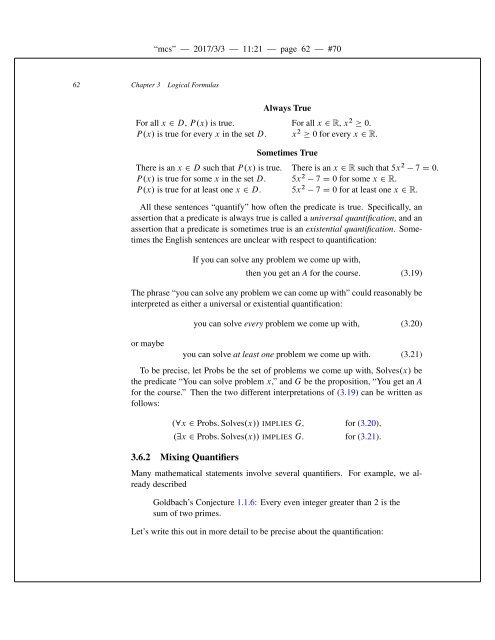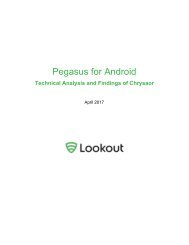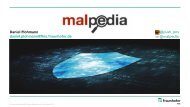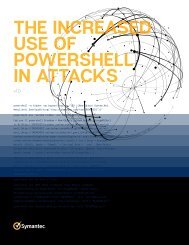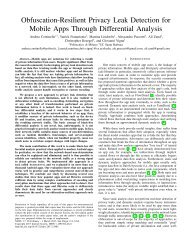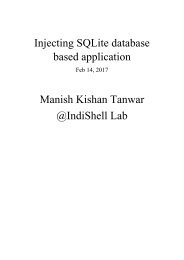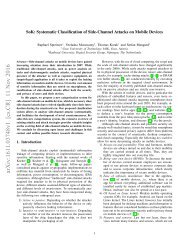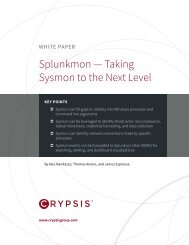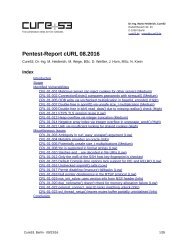×
Your ePaper is waiting for publication!
By publishing your document, the content will be optimally indexed by Google via AI and sorted into the right category for over 500 million ePaper readers on YUMPU.
This will ensure high visibility and many readers!
PUBLISH DOCUMENT
No, I renounce more range.
You can find your publication here:
Share your interactive ePaper on all platforms and on your website with our embed function
⬤
⬤
Mathematics for Computer Science
Create successful ePaper yourself
Turn your PDF publications into a flip-book with our unique Google optimized e-Paper software.
“mcs” — 2017/3/3 — 11:21 — page 62 — #70<br />
62<br />
Chapter 3<br />
Logical Formulas<br />
Always True<br />
For all x 2 D, P.x/ is true. For all x 2 R, x 2 0.<br />
P.x/ is true <strong>for</strong> every x in the set D. x 2 0 <strong>for</strong> every x 2 R.<br />
Sometimes True<br />
There is an x 2 D such that P.x/ is true. There is an x 2 R such that 5x 2 7 D 0.<br />
P.x/ is true <strong>for</strong> some x in the set D. 5x 2 7 D 0 <strong>for</strong> some x 2 R.<br />
P.x/ is true <strong>for</strong> at least one x 2 D. 5x 2 7 D 0 <strong>for</strong> at least one x 2 R.<br />
All these sentences “quantify” how often the predicate is true. Specifically, an<br />
assertion that a predicate is always true is called a universal quantification, and an<br />
assertion that a predicate is sometimes true is an existential quantification. Sometimes<br />
the English sentences are unclear with respect to quantification:<br />
If you can solve any problem we come up with,<br />
then you get an A <strong>for</strong> the course. (3.19)<br />
The phrase “you can solve any problem we can come up with” could reasonably be<br />
interpreted as either a universal or existential quantification:<br />
you can solve every problem we come up with, (3.20)<br />
or maybe<br />
you can solve at least one problem we come up with. (3.21)<br />
To be precise, let Probs be the set of problems we come up with, Solves.x/ be<br />
the predicate “You can solve problem x,” and G be the proposition, “You get an A<br />
<strong>for</strong> the course.” Then the two different interpretations of (3.19) can be written as<br />
follows:<br />
.8x 2 Probs: Solves.x// IMPLIES G; <strong>for</strong> (3.20);<br />
.9x 2 Probs: Solves.x// IMPLIES G: <strong>for</strong> (3.21):<br />
3.6.2 Mixing Quantifiers<br />
Many mathematical statements involve several quantifiers. For example, we already<br />
described<br />
Goldbach’s Conjecture 1.1.6: Every even integer greater than 2 is the<br />
sum of two primes.<br />
Let’s write this out in more detail to be precise about the quantification:
“mcs” — 2017/3/3 — 11:21 — page 62 — #70 62 Chapter 3 Logical Formulas Always True For all x 2 D, P.x/ is true. For all x 2 R, x 2 0. P.x/ is true <strong>for</strong> every x in the set D. x 2 0 <strong>for</strong> every x 2 R. Sometimes True There is an x 2 D such that P.x/ is true. There is an x 2 R such that 5x 2 7 D 0. P.x/ is true <strong>for</strong> some x in the set D. 5x 2 7 D 0 <strong>for</strong> some x 2 R. P.x/ is true <strong>for</strong> at least one x 2 D. 5x 2 7 D 0 <strong>for</strong> at least one x 2 R. All these sentences “quantify” how often the predicate is true. Specifically, an assertion that a predicate is always true is called a universal quantification, and an assertion that a predicate is sometimes true is an existential quantification. Sometimes the English sentences are unclear with respect to quantification: If you can solve any problem we come up with, then you get an A <strong>for</strong> the course. (3.19) The phrase “you can solve any problem we can come up with” could reasonably be interpreted as either a universal or existential quantification: you can solve every problem we come up with, (3.20) or maybe you can solve at least one problem we come up with. (3.21) To be precise, let Probs be the set of problems we come up with, Solves.x/ be the predicate “You can solve problem x,” and G be the proposition, “You get an A <strong>for</strong> the course.” Then the two different interpretations of (3.19) can be written as follows: .8x 2 Probs: Solves.x// IMPLIES G; <strong>for</strong> (3.20); .9x 2 Probs: Solves.x// IMPLIES G: <strong>for</strong> (3.21): 3.6.2 Mixing Quantifiers Many mathematical statements involve several quantifiers. For example, we already described Goldbach’s Conjecture 1.1.6: Every even integer greater than 2 is the sum of two primes. Let’s write this out in more detail to be precise about the quantification:
“mcs” — 2017/3/3 — 11:21 — page 63 — #71 3.6. Predicate Formulas 63 For every even integer n greater than 2, there exist primes p and q such that n D p C q. Let Evens be the set of even integers greater than 2, and let Primes be the set of primes. Then we can write Goldbach’s Conjecture in logic notation as follows: 8n 2 Evens „ ƒ‚ … <strong>for</strong> every even integer n > 2 3.6.3 Order of Quantifiers 9p 2 Primes 9q 2 Primes: „ ƒ‚ … there exist primes p and q such that n D p C q: Swapping the order of different kinds of quantifiers (existential or universal) usually changes the meaning of a proposition. For example, let’s return to one of our initial, confusing statements: “Every American has a dream.” This sentence is ambiguous because the order of quantifiers is unclear. Let A be the set of Americans, let D be the set of dreams, and define the predicate H.a; d/ to be “American a has dream d.” Now the sentence could mean there is a single dream that every American shares—such as the dream of owning their own home: 9 d 2 D 8a 2 A: H.a; d/ Or it could mean that every American has a personal dream: 8a 2 A 9 d 2 D: H.a; d/ For example, some Americans may dream of a peaceful retirement, while others dream of continuing practicing their profession as long as they live, and still others may dream of being so rich they needn’t think about work at all. Swapping quantifiers in Goldbach’s Conjecture creates a patently false statement that every even number 2 is the sum of the same two primes: 9 p 2 Primes 9 q 2 Primes: „ ƒ‚ … there exist primes p and q such that 3.6.4 Variables Over One Domain 8n 2 Evens „ ƒ‚ … <strong>for</strong> every even integer n > 2 n D p C q: When all the variables in a <strong>for</strong>mula are understood to take values from the same nonempty set D it’s conventional to omit mention of D. For example, instead of 8x 2 D 9y 2 D: Q.x; y/ we’d write 8x9y: Q.x; y/. The unnamed nonempty set
Page 1 and 2: “mcs” — 2017/3/3 — 11:21
Page 3 and 4: “mcs” — 2017/3/3 — 11:21
Page 5 and 6: “mcs” — 2017/3/3 — 11:21
Page 7 and 8: “mcs” — 2017/3/3 — 11:21
Page 9 and 10: “mcs” — 2017/3/3 — 11:21
Page 11 and 12: “mcs” — 2017/3/3 — 11:21
Page 13 and 14: “mcs” — 2017/3/3 — 11:21
Page 15 and 16: “mcs” — 2017/3/3 — 11:21
Page 17 and 18: “mcs” — 2017/3/3 — 11:21
Page 19 and 20: “mcs” — 2017/3/3 — 11:21 Page 21 and 22: “mcs” — 2017/3/3 — 11:21 Page 23 and 24: “mcs” — 2017/3/3 — 11:21 Page 25 and 26: “mcs” — 2017/3/3 — 11:21 Page 27 and 28: “mcs” — 2017/3/3 — 11:21 Page 29 and 30: “mcs” — 2017/3/3 — 11:21 Page 31 and 32: “mcs” — 2017/3/3 — 11:21 Page 33 and 34: “mcs” — 2017/3/3 — 11:21 Page 35 and 36: “mcs” — 2017/3/3 — 11:21 Page 37 and 38: “mcs” — 2017/3/3 — 11:21 Page 39 and 40: “mcs” — 2017/3/3 — 11:21 Page 41 and 42: “mcs” — 2017/3/3 — 11:21 Page 43 and 44: “mcs” — 2017/3/3 — 11:21 Page 45 and 46: “mcs” — 2017/3/3 — 11:21 Page 47 and 48: “mcs” — 2017/3/3 — 11:21 Page 49 and 50: “mcs” — 2017/3/3 — 11:21 Page 51 and 52: “mcs” — 2017/3/3 — 11:21 Page 53 and 54: “mcs” — 2017/3/3 — 11:21 Page 55 and 56: “mcs” — 2017/3/3 — 11:21 Page 57 and 58: “mcs” — 2017/3/3 — 11:21 Page 59 and 60: “mcs” — 2017/3/3 — 11:21 Page 61 and 62: “mcs” — 2017/3/3 — 11:21 Page 63 and 64: “mcs” — 2017/3/3 — 11:21 Page 65 and 66: “mcs” — 2017/3/3 — 11:21 Page 67 and 68: “mcs” — 2017/3/3 — 11:21 Page 69: “mcs” — 2017/3/3 — 11:21 Page 73 and 74: “mcs” — 2017/3/3 — 11:21 Page 75 and 76: “mcs” — 2017/3/3 — 11:21 Page 77 and 78: “mcs” — 2017/3/3 — 11:21 Page 79 and 80: “mcs” — 2017/3/3 — 11:21 Page 81 and 82: “mcs” — 2017/3/3 — 11:21 Page 83 and 84: “mcs” — 2017/3/3 — 11:21 Page 85 and 86: “mcs” — 2017/3/3 — 11:21 Page 87 and 88: “mcs” — 2017/3/3 — 11:21 Page 89 and 90: “mcs” — 2017/3/3 — 11:21 Page 91 and 92: “mcs” — 2017/3/3 — 11:21 Page 93 and 94: “mcs” — 2017/3/3 — 11:21 Page 95 and 96: “mcs” — 2017/3/3 — 11:21 Page 97 and 98: “mcs” — 2017/3/3 — 11:21 Page 99 and 100: “mcs” — 2017/3/3 — 11:21 Page 101 and 102: “mcs” — 2017/3/3 — 11:21 Page 103 and 104: “mcs” — 2017/3/3 — 11:21 Page 105 and 106: “mcs” — 2017/3/3 — 11:21 Page 107 and 108: “mcs” — 2017/3/3 — 11:21 Page 109 and 110: “mcs” — 2017/3/3 — 11:21 Page 111 and 112: “mcs” — 2017/3/3 — 11:21 Page 113 and 114: “mcs” — 2017/3/3 — 11:21 Page 115 and 116: “mcs” — 2017/3/3 — 11:21 Page 117 and 118: “mcs” — 2017/3/3 — 11:21 Page 119 and 120: “mcs” — 2017/3/3 — 11:21 Page 121 and 122: “mcs” — 2017/3/3 — 11:21
Page 123 and 124: “mcs” — 2017/3/3 — 11:21
Page 125 and 126: “mcs” — 2017/3/3 — 11:21
Page 127 and 128: “mcs” — 2017/3/3 — 11:21
Page 129 and 130: “mcs” — 2017/3/3 — 11:21
Page 131 and 132: “mcs” — 2017/3/3 — 11:21
Page 133 and 134: “mcs” — 2017/3/3 — 11:21
Page 135 and 136: “mcs” — 2017/3/3 — 11:21
Page 137 and 138: “mcs” — 2017/3/3 — 11:21
Page 139 and 140: “mcs” — 2017/3/3 — 11:21
Page 141 and 142: “mcs” — 2017/3/3 — 11:21
Page 143 and 144: “mcs” — 2017/3/3 — 11:21
Page 145 and 146: “mcs” — 2017/3/3 — 11:21
Page 147 and 148: “mcs” — 2017/3/3 — 11:21
Page 149 and 150: “mcs” — 2017/3/3 — 11:21
Page 151 and 152: “mcs” — 2017/3/3 — 11:21
Page 153 and 154: “mcs” — 2017/3/3 — 11:21
Page 155 and 156: “mcs” — 2017/3/3 — 11:21
Page 157 and 158: “mcs” — 2017/3/3 — 11:21
Page 159 and 160: “mcs” — 2017/3/3 — 11:21
Page 161 and 162: “mcs” — 2017/3/3 — 11:21
Page 163 and 164: “mcs” — 2017/3/3 — 11:21
Page 165 and 166: “mcs” — 2017/3/3 — 11:21
Page 167 and 168: “mcs” — 2017/3/3 — 11:21
Page 169 and 170: “mcs” — 2017/3/3 — 11:21
Page 171 and 172: “mcs” — 2017/3/3 — 11:21
Page 173 and 174: “mcs” — 2017/3/3 — 11:21
Page 175 and 176: “mcs” — 2017/3/3 — 11:21
Page 177 and 178: “mcs” — 2017/3/3 — 11:21
Page 179 and 180: “mcs” — 2017/3/3 — 11:21
Page 181 and 182: “mcs” — 2017/3/3 — 11:21
Page 183 and 184: “mcs” — 2017/3/3 — 11:21
Page 185 and 186: “mcs” — 2017/3/3 — 11:21
Page 187 and 188: “mcs” — 2017/3/3 — 11:21
Page 189 and 190: “mcs” — 2017/3/3 — 11:21
Page 191 and 192: “mcs” — 2017/3/3 — 11:21
Page 193 and 194: “mcs” — 2017/3/3 — 11:21
Page 195 and 196: “mcs” — 2017/3/3 — 11:21
Page 197 and 198: “mcs” — 2017/3/3 — 11:21
Page 199 and 200: “mcs” — 2017/3/3 — 11:21
Page 201 and 202: “mcs” — 2017/3/3 — 11:21
Page 203 and 204: “mcs” — 2017/3/3 — 11:21
Page 205 and 206: “mcs” — 2017/3/3 — 11:21
Page 207 and 208: “mcs” — 2017/3/3 — 11:21
Page 209 and 210: “mcs” — 2017/3/3 — 11:21
Page 211 and 212: “mcs” — 2017/3/3 — 11:21
Page 213 and 214: “mcs” — 2017/3/3 — 11:21
Page 215 and 216: “mcs” — 2017/3/3 — 11:21
Page 217 and 218: “mcs” — 2017/3/3 — 11:21
Page 219 and 220: “mcs” — 2017/3/3 — 11:21
Page 221 and 222: “mcs” — 2017/3/3 — 11:21
Page 223 and 224: “mcs” — 2017/3/3 — 11:21
Page 225 and 226: “mcs” — 2017/3/3 — 11:21
Page 227 and 228: “mcs” — 2017/3/3 — 11:21
Page 229 and 230: “mcs” — 2017/3/3 — 11:21
Page 231 and 232: “mcs” — 2017/3/3 — 11:21
Page 233 and 234: “mcs” — 2017/3/3 — 11:21
Page 235 and 236: “mcs” — 2017/3/3 — 11:21
Page 237 and 238: “mcs” — 2017/3/3 — 11:21
Page 239 and 240: “mcs” — 2017/3/3 — 11:21
Page 241 and 242: “mcs” — 2017/3/3 — 11:21
Page 243 and 244: “mcs” — 2017/3/3 — 11:21
Page 245 and 246: “mcs” — 2017/3/3 — 11:21
Page 247 and 248: “mcs” — 2017/3/3 — 11:21
Page 249 and 250: “mcs” — 2017/3/3 — 11:21
Page 251 and 252: “mcs” — 2017/3/3 — 11:21
Page 253 and 254: “mcs” — 2017/3/3 — 11:21
Page 255 and 256: “mcs” — 2017/3/3 — 11:21
Page 257 and 258: “mcs” — 2017/3/3 — 11:21
Page 259 and 260: “mcs” — 2017/3/3 — 11:21
Page 261 and 262: “mcs” — 2017/3/3 — 11:21
Page 263 and 264: “mcs” — 2017/3/3 — 11:21
Page 265 and 266: “mcs” — 2017/3/3 — 11:21
Page 267 and 268: “mcs” — 2017/3/3 — 11:21
Page 269 and 270: “mcs” — 2017/3/3 — 11:21
Page 271 and 272: “mcs” — 2017/3/3 — 11:21
Page 273 and 274: “mcs” — 2017/3/3 — 11:21
Page 275 and 276: “mcs” — 2017/3/3 — 11:21
Page 277 and 278: “mcs” — 2017/3/3 — 11:21
Page 279 and 280: “mcs” — 2017/3/3 — 11:21
Page 281 and 282: “mcs” — 2017/3/3 — 11:21
Page 283 and 284: “mcs” — 2017/3/3 — 11:21
Page 285 and 286: “mcs” — 2017/3/3 — 11:21
Page 287 and 288: “mcs” — 2017/3/3 — 11:21
Page 289 and 290: “mcs” — 2017/3/3 — 11:21
Page 291 and 292: “mcs” — 2017/3/3 — 11:21
Page 293 and 294: “mcs” — 2017/3/3 — 11:21
Page 295 and 296: “mcs” — 2017/3/3 — 11:21
Page 297 and 298: “mcs” — 2017/3/3 — 11:21
Page 299 and 300: “mcs” — 2017/3/3 — 11:21
Page 301 and 302: “mcs” — 2017/3/3 — 11:21
Page 303 and 304: “mcs” — 2017/3/3 — 11:21
Page 305 and 306: “mcs” — 2017/3/3 — 11:21
Page 307 and 308: “mcs” — 2017/3/3 — 11:21
Page 309 and 310: “mcs” — 2017/3/3 — 11:21
Page 311 and 312: “mcs” — 2017/3/3 — 11:21
Page 313 and 314: “mcs” — 2017/3/3 — 11:21
Page 315 and 316: “mcs” — 2017/3/3 — 11:21
Page 317 and 318: “mcs” — 2017/3/3 — 11:21
Page 319 and 320: “mcs” — 2017/3/3 — 11:21
Page 321 and 322: “mcs” — 2017/3/3 — 11:21
Page 323 and 324: “mcs” — 2017/3/3 — 11:21
Page 325 and 326: “mcs” — 2017/3/3 — 11:21
Page 327 and 328: “mcs” — 2017/3/3 — 11:21
Page 329 and 330: “mcs” — 2017/3/3 — 11:21
Page 331 and 332: “mcs” — 2017/3/3 — 11:21
Page 333 and 334: “mcs” — 2017/3/3 — 11:21
Page 335 and 336: “mcs” — 2017/3/3 — 11:21
Page 337 and 338: “mcs” — 2017/3/3 — 11:21
Page 339 and 340: “mcs” — 2017/3/3 — 11:21
Page 341 and 342: “mcs” — 2017/3/3 — 11:21
Page 343 and 344: “mcs” — 2017/3/3 — 11:21
Page 345 and 346: “mcs” — 2017/3/3 — 11:21
Page 347 and 348: “mcs” — 2017/3/3 — 11:21
Page 349 and 350: “mcs” — 2017/3/3 — 11:21
Page 351 and 352: “mcs” — 2017/3/3 — 11:21
Page 353 and 354: “mcs” — 2017/3/3 — 11:21
Page 355 and 356: “mcs” — 2017/3/3 — 11:21
Page 357 and 358: “mcs” — 2017/3/3 — 11:21
Page 359 and 360: “mcs” — 2017/3/3 — 11:21
Page 361 and 362: “mcs” — 2017/3/3 — 11:21
Page 363 and 364: “mcs” — 2017/3/3 — 11:21
Page 365 and 366: “mcs” — 2017/3/3 — 11:21
Page 367 and 368: “mcs” — 2017/3/3 — 11:21
Page 369 and 370: “mcs” — 2017/3/3 — 11:21
Page 371 and 372: “mcs” — 2017/3/3 — 11:21
Page 373 and 374: “mcs” — 2017/3/3 — 11:21
Page 375 and 376: “mcs” — 2017/3/3 — 11:21
Page 377 and 378: “mcs” — 2017/3/3 — 11:21
Page 379 and 380: “mcs” — 2017/3/3 — 11:21
Page 381 and 382: “mcs” — 2017/3/3 — 11:21
Page 383 and 384: “mcs” — 2017/3/3 — 11:21
Page 385 and 386: “mcs” — 2017/3/3 — 11:21
Page 387 and 388: “mcs” — 2017/3/3 — 11:21
Page 389 and 390: “mcs” — 2017/3/3 — 11:21
Page 391 and 392: “mcs” — 2017/3/3 — 11:21
Page 393 and 394: “mcs” — 2017/3/3 — 11:21
Page 395 and 396: “mcs” — 2017/3/3 — 11:21
Page 397 and 398: “mcs” — 2017/3/3 — 11:21
Page 399 and 400: “mcs” — 2017/3/3 — 11:21
Page 401 and 402: “mcs” — 2017/3/3 — 11:21
Page 403 and 404: “mcs” — 2017/3/3 — 11:21
Page 405 and 406: “mcs” — 2017/3/3 — 11:21
Page 407 and 408: “mcs” — 2017/3/3 — 11:21
Page 409 and 410: “mcs” — 2017/3/3 — 11:21
Page 411 and 412: “mcs” — 2017/3/3 — 11:21
Page 413 and 414: “mcs” — 2017/3/3 — 11:21
Page 415 and 416: “mcs” — 2017/3/3 — 11:21
Page 417 and 418: “mcs” — 2017/3/3 — 11:21
Page 419 and 420: “mcs” — 2017/3/3 — 11:21
Page 421 and 422: “mcs” — 2017/3/3 — 11:21
Page 423 and 424: “mcs” — 2017/3/3 — 11:21
Page 425 and 426: “mcs” — 2017/3/3 — 11:21
Page 427 and 428: “mcs” — 2017/3/3 — 11:21
Page 429 and 430: “mcs” — 2017/3/3 — 11:21
Page 431 and 432: “mcs” — 2017/3/3 — 11:21
Page 433 and 434: “mcs” — 2017/3/3 — 11:21
Page 435 and 436: “mcs” — 2017/3/3 — 11:21
Page 437 and 438: “mcs” — 2017/3/3 — 11:21
Page 439 and 440: À “mcs” — 2017/3/3 — 11:21
Page 441 and 442: “mcs” — 2017/3/3 — 11:21
Page 443 and 444: “mcs” — 2017/3/3 — 11:21
Page 445 and 446: “mcs” — 2017/3/3 — 11:21
Page 447 and 448: “mcs” — 2017/3/3 — 11:21
Page 449 and 450: “mcs” — 2017/3/3 — 11:21
Page 451 and 452: “mcs” — 2017/3/3 — 11:21
Page 453 and 454: “mcs” — 2017/3/3 — 11:21
Page 455 and 456: “mcs” — 2017/3/3 — 11:21
Page 457 and 458: “mcs” — 2017/3/3 — 11:21
Page 459 and 460: “mcs” — 2017/3/3 — 11:21
Page 461 and 462: “mcs” — 2017/3/3 — 11:21
Page 463 and 464: “mcs” — 2017/3/3 — 11:21
Page 465 and 466: “mcs” — 2017/3/3 — 11:21
Page 467 and 468: “mcs” — 2017/3/3 — 11:21
Page 469 and 470: “mcs” — 2017/3/3 — 11:21
Page 471 and 472: “mcs” — 2017/3/3 — 11:21
Page 473 and 474: “mcs” — 2017/3/3 — 11:21
Page 475 and 476: “mcs” — 2017/3/3 — 11:21
Page 477 and 478: “mcs” — 2017/3/3 — 11:21
Page 479 and 480: “mcs” — 2017/3/3 — 11:21
Page 481 and 482: “mcs” — 2017/3/3 — 11:21
Page 483 and 484: “mcs” — 2017/3/3 — 11:21
Page 485 and 486: “mcs” — 2017/3/3 — 11:21
Page 487 and 488: “mcs” — 2017/3/3 — 11:21
Page 489 and 490: “mcs” — 2017/3/3 — 11:21
Page 491 and 492: “mcs” — 2017/3/3 — 11:21
Page 493 and 494: “mcs” — 2017/3/3 — 11:21
Page 495 and 496: “mcs” — 2017/3/3 — 11:21
Page 497 and 498: “mcs” — 2017/3/3 — 11:21
Page 499 and 500: “mcs” — 2017/3/3 — 11:21
Page 501 and 502: “mcs” — 2017/3/3 — 11:21
Page 503 and 504: “mcs” — 2017/3/3 — 11:21
Page 505 and 506: “mcs” — 2017/3/3 — 11:21
Page 507 and 508: “mcs” — 2017/3/3 — 11:21
Page 509 and 510: “mcs” — 2017/3/3 — 11:21
Page 511 and 512: “mcs” — 2017/3/3 — 11:21
Page 513 and 514: “mcs” — 2017/3/3 — 11:21
Page 515 and 516: “mcs” — 2017/3/3 — 11:21
Page 517 and 518: “mcs” — 2017/3/3 — 11:21
Page 519 and 520: “mcs” — 2017/3/3 — 11:21
Page 521 and 522: “mcs” — 2017/3/3 — 11:21
Page 523 and 524: “mcs” — 2017/3/3 — 11:21
Page 525 and 526: “mcs” — 2017/3/3 — 11:21
Page 527 and 528: “mcs” — 2017/3/3 — 11:21
Page 529 and 530: “mcs” — 2017/3/3 — 11:21
Page 531 and 532: “mcs” — 2017/3/3 — 11:21
Page 533 and 534: “mcs” — 2017/3/3 — 11:21
Page 535 and 536: “mcs” — 2017/3/3 — 11:21
Page 537 and 538: “mcs” — 2017/3/3 — 11:21
Page 539 and 540: “mcs” — 2017/3/3 — 11:21
Page 541 and 542: “mcs” — 2017/3/3 — 11:21
Page 543 and 544: “mcs” — 2017/3/3 — 11:21
Page 545 and 546: “mcs” — 2017/3/3 — 11:21
Page 547 and 548: “mcs” — 2017/3/3 — 11:21
Page 549 and 550: “mcs” — 2017/3/3 — 11:21
Page 551 and 552: “mcs” — 2017/3/3 — 11:21
Page 553 and 554: “mcs” — 2017/3/3 — 11:21
Page 555 and 556: “mcs” — 2017/3/3 — 11:21
Page 557 and 558: “mcs” — 2017/3/3 — 11:21
Page 559 and 560: “mcs” — 2017/3/3 — 11:21
Page 561 and 562: “mcs” — 2017/3/3 — 11:21
Page 563 and 564: “mcs” — 2017/3/3 — 11:21
Page 565 and 566: “mcs” — 2017/3/3 — 11:21
Page 567 and 568: “mcs” — 2017/3/3 — 11:21
Page 569 and 570: “mcs” — 2017/3/3 — 11:21
Page 571 and 572: “mcs” — 2017/3/3 — 11:21
Page 573 and 574: “mcs” — 2017/3/3 — 11:21
Page 575 and 576: “mcs” — 2017/3/3 — 11:21
Page 577 and 578: “mcs” — 2017/3/3 — 11:21
Page 579 and 580: “mcs” — 2017/3/3 — 11:21
Page 581 and 582: “mcs” — 2017/3/3 — 11:21
Page 583 and 584: “mcs” — 2017/3/3 — 11:21
Page 585 and 586: “mcs” — 2017/3/3 — 11:21
Page 587 and 588: “mcs” — 2017/3/3 — 11:21
Page 589 and 590: “mcs” — 2017/3/3 — 11:21
Page 591 and 592: “mcs” — 2017/3/3 — 11:21
Page 593 and 594: “mcs” — 2017/3/3 — 11:21
Page 595 and 596: “mcs” — 2017/3/3 — 11:21
Page 597 and 598: “mcs” — 2017/3/3 — 11:21
Page 599 and 600: “mcs” — 2017/3/3 — 11:21
Page 601 and 602: “mcs” — 2017/3/3 — 11:21
Page 603 and 604: “mcs” — 2017/3/3 — 11:21
Page 605 and 606: “mcs” — 2017/3/3 — 11:21
Page 607 and 608: “mcs” — 2017/3/3 — 11:21
Page 609 and 610: “mcs” — 2017/3/3 — 11:21
Page 611 and 612: “mcs” — 2017/3/3 — 11:21
Page 613 and 614: “mcs” — 2017/3/3 — 11:21
Page 615 and 616: “mcs” — 2017/3/3 — 11:21
Page 617 and 618: “mcs” — 2017/3/3 — 11:21
Page 619 and 620: “mcs” — 2017/3/3 — 11:21
Page 621 and 622: “mcs” — 2017/3/3 — 11:21
Page 623 and 624: “mcs” — 2017/3/3 — 11:21
Page 625 and 626: “mcs” — 2017/3/3 — 11:21
Page 627 and 628: “mcs” — 2017/3/3 — 11:21
Page 629 and 630: “mcs” — 2017/3/3 — 11:21
Page 631 and 632: “mcs” — 2017/3/3 — 11:21
Page 633 and 634: “mcs” — 2017/3/3 — 11:21
Page 635 and 636: “mcs” — 2017/3/3 — 11:21
Page 637 and 638: “mcs” — 2017/3/3 — 11:21
Page 639 and 640: “mcs” — 2017/3/3 — 11:21
Page 641 and 642: “mcs” — 2017/3/3 — 11:21
Page 643 and 644: “mcs” — 2017/3/3 — 11:21
Page 645 and 646: “mcs” — 2017/3/3 — 11:21
Page 647 and 648: “mcs” — 2017/3/3 — 11:21
Page 649 and 650: “mcs” — 2017/3/3 — 11:21
Page 651 and 652: “mcs” — 2017/3/3 — 11:21
Page 653 and 654: “mcs” — 2017/3/3 — 11:21
Page 655 and 656: “mcs” — 2017/3/3 — 11:21
Page 657 and 658: “mcs” — 2017/3/3 — 11:21
Page 659 and 660: “mcs” — 2017/3/3 — 11:21
Page 661 and 662: “mcs” — 2017/3/3 — 11:21
Page 663 and 664: “mcs” — 2017/3/3 — 11:21
Page 665 and 666: “mcs” — 2017/3/3 — 11:21
Page 667 and 668: “mcs” — 2017/3/3 — 11:21
Page 669 and 670: “mcs” — 2017/3/3 — 11:21
Page 671 and 672: “mcs” — 2017/3/3 — 11:21
Page 673 and 674: “mcs” — 2017/3/3 — 11:21
Page 675 and 676: “mcs” — 2017/3/3 — 11:21
Page 677 and 678: “mcs” — 2017/3/3 — 11:21
Page 679 and 680: “mcs” — 2017/3/3 — 11:21
Page 681 and 682: “mcs” — 2017/3/3 — 11:21
Page 683 and 684: “mcs” — 2017/3/3 — 11:21
Page 685 and 686: “mcs” — 2017/3/3 — 11:21
Page 687 and 688: “mcs” — 2017/3/3 — 11:21
Page 689 and 690: “mcs” — 2017/3/3 — 11:21
Page 691 and 692: “mcs” — 2017/3/3 — 11:21
Page 693 and 694: “mcs” — 2017/3/3 — 11:21
Page 695 and 696: “mcs” — 2017/3/3 — 11:21
Page 697 and 698: “mcs” — 2017/3/3 — 11:21
Page 699 and 700: “mcs” — 2017/3/3 — 11:21
Page 701 and 702: “mcs” — 2017/3/3 — 11:21
Page 703 and 704: “mcs” — 2017/3/3 — 11:21
Page 705 and 706: “mcs” — 2017/3/3 — 11:21
Page 707 and 708: “mcs” — 2017/3/3 — 11:21
Page 709 and 710: “mcs” — 2017/3/3 — 11:21
Page 711 and 712: “mcs” — 2017/3/3 — 11:21
Page 713 and 714: “mcs” — 2017/3/3 — 11:21
Page 715 and 716: “mcs” — 2017/3/3 — 11:21
Page 717 and 718: “mcs” — 2017/3/3 — 11:21
Page 719 and 720: “mcs” — 2017/3/3 — 11:21
Page 721 and 722: “mcs” — 2017/3/3 — 11:21
Page 723 and 724: “mcs” — 2017/3/3 — 11:21
Page 725 and 726: “mcs” — 2017/3/3 — 11:21
Page 727 and 728: “mcs” — 2017/3/3 — 11:21
Page 729 and 730: “mcs” — 2017/3/3 — 11:21
Page 731 and 732: “mcs” — 2017/3/3 — 11:21
Page 733 and 734: “mcs” — 2017/3/3 — 11:21
Page 735 and 736: “mcs” — 2017/3/3 — 11:21
Page 737 and 738: “mcs” — 2017/3/3 — 11:21
Page 739 and 740: “mcs” — 2017/3/3 — 11:21
Page 741 and 742: “mcs” — 2017/3/3 — 11:21
Page 743 and 744: “mcs” — 2017/3/3 — 11:21
Page 745 and 746: “mcs” — 2017/3/3 — 11:21
Page 747 and 748: “mcs” — 2017/3/3 — 11:21
Page 749 and 750: “mcs” — 2017/3/3 — 11:21
Page 751 and 752: “mcs” — 2017/3/3 — 11:21
Page 753 and 754: “mcs” — 2017/3/3 — 11:21
Page 755 and 756: “mcs” — 2017/3/3 — 11:21
Page 757 and 758: “mcs” — 2017/3/3 — 11:21
Page 759 and 760: “mcs” — 2017/3/3 — 11:21
Page 761 and 762: “mcs” — 2017/3/3 — 11:21
Page 763 and 764: “mcs” — 2017/3/3 — 11:21
Page 765 and 766: “mcs” — 2017/3/3 — 11:21
Page 767 and 768: “mcs” — 2017/3/3 — 11:21
Page 769 and 770: “mcs” — 2017/3/3 — 11:21
Page 771 and 772: “mcs” — 2017/3/3 — 11:21
Page 773 and 774: “mcs” — 2017/3/3 — 11:21
Page 775 and 776: “mcs” — 2017/3/3 — 11:21
Page 777 and 778: “mcs” — 2017/3/3 — 11:21
Page 779 and 780: “mcs” — 2017/3/3 — 11:21
Page 781 and 782: “mcs” — 2017/3/3 — 11:21
Page 783 and 784: “mcs” — 2017/3/3 — 11:21
Page 785 and 786: “mcs” — 2017/3/3 — 11:21
Page 787 and 788: “mcs” — 2017/3/3 — 11:21
Page 789 and 790: “mcs” — 2017/3/3 — 11:21
Page 791 and 792: “mcs” — 2017/3/3 — 11:21
Page 793 and 794: “mcs” — 2017/3/3 — 11:21
Page 795 and 796: “mcs” — 2017/3/3 — 11:21
Page 797 and 798: “mcs” — 2017/3/3 — 11:21
Page 799 and 800: “mcs” — 2017/3/3 — 11:21
Page 801 and 802: “mcs” — 2017/3/3 — 11:21
Page 803 and 804: “mcs” — 2017/3/3 — 11:21
Page 805 and 806: “mcs” — 2017/3/3 — 11:21
Page 807 and 808: “mcs” — 2017/3/3 — 11:21
Page 809 and 810: “mcs” — 2017/3/3 — 11:21
Page 811 and 812: “mcs” — 2017/3/3 — 11:21
Page 813 and 814: “mcs” — 2017/3/3 — 11:21
Page 815 and 816: “mcs” — 2017/3/3 — 11:21
Page 817 and 818: “mcs” — 2017/3/3 — 11:21
Page 819 and 820: “mcs” — 2017/3/3 — 11:21
Page 821 and 822: “mcs” — 2017/3/3 — 11:21
Page 823 and 824: “mcs” — 2017/3/3 — 11:21
Page 825 and 826: “mcs” — 2017/3/3 — 11:21
Page 827 and 828: “mcs” — 2017/3/3 — 11:21
Page 829 and 830: “mcs” — 2017/3/3 — 11:21
Page 831 and 832: “mcs” — 2017/3/3 — 11:21
Page 833 and 834: “mcs” — 2017/3/3 — 11:21
Page 835 and 836: “mcs” — 2017/3/3 — 11:21
Page 837 and 838: “mcs” — 2017/3/3 — 11:21
Page 839 and 840: “mcs” — 2017/3/3 — 11:21
Page 841 and 842: “mcs” — 2017/3/3 — 11:21
Page 843 and 844: “mcs” — 2017/3/3 — 11:21
Page 845 and 846: “mcs” — 2017/3/3 — 11:21
Page 847 and 848: “mcs” — 2017/3/3 — 11:21
Page 849 and 850: “mcs” — 2017/3/3 — 11:21
Page 851 and 852: “mcs” — 2017/3/3 — 11:21
Page 853 and 854: “mcs” — 2017/3/3 — 11:21
Page 855 and 856: “mcs” — 2017/3/3 — 11:21
Page 857 and 858: “mcs” — 2017/3/3 — 11:21
Page 859 and 860: “mcs” — 2017/3/3 — 11:21
Page 861 and 862: “mcs” — 2017/3/3 — 11:21
Page 863 and 864: “mcs” — 2017/3/3 — 11:21
Page 865 and 866: “mcs” — 2017/3/3 — 11:21
Page 867 and 868: “mcs” — 2017/3/3 — 11:21
Page 869 and 870: “mcs” — 2017/3/3 — 11:21
Page 871 and 872: “mcs” — 2017/3/3 — 11:21
Page 873 and 874: “mcs” — 2017/3/3 — 11:21
Page 875 and 876: “mcs” — 2017/3/3 — 11:21
Page 877 and 878: “mcs” — 2017/3/3 — 11:21
Page 879 and 880: “mcs” — 2017/3/3 — 11:21
Page 881 and 882: “mcs” — 2017/3/3 — 11:21
Page 883 and 884: “mcs” — 2017/3/3 — 11:21
Page 885 and 886: “mcs” — 2017/3/3 — 11:21
Page 887 and 888: “mcs” — 2017/3/3 — 11:21
Page 889 and 890: “mcs” — 2017/3/3 — 11:21
Page 891 and 892: “mcs” — 2017/3/3 — 11:21
Page 893 and 894: “mcs” — 2017/3/3 — 11:21
Page 895 and 896: “mcs” — 2017/3/3 — 11:21
Page 897 and 898: “mcs” — 2017/3/3 — 11:21
Page 899 and 900: “mcs” — 2017/3/3 — 11:21
Page 901 and 902: “mcs” — 2017/3/3 — 11:21
Page 903 and 904: “mcs” — 2017/3/3 — 11:21
Page 905 and 906: “mcs” — 2017/3/3 — 11:21
Page 907 and 908: “mcs” — 2017/3/3 — 11:21
Page 909 and 910: “mcs” — 2017/3/3 — 11:21
Page 911 and 912: “mcs” — 2017/3/3 — 11:21
Page 913 and 914: “mcs” — 2017/3/3 — 11:21
Page 915 and 916: “mcs” — 2017/3/3 — 11:21
Page 917 and 918: “mcs” — 2017/3/3 — 11:21
Page 919 and 920: “mcs” — 2017/3/3 — 11:21
Page 921 and 922: “mcs” — 2017/3/3 — 11:21
Page 923 and 924: “mcs” — 2017/3/3 — 11:21
Page 925 and 926: “mcs” — 2017/3/3 — 11:21
Page 927 and 928: “mcs” — 2017/3/3 — 11:21
Page 929 and 930: “mcs” — 2017/3/3 — 11:21
Page 931 and 932: “mcs” — 2017/3/3 — 11:21
Page 933 and 934: “mcs” — 2017/3/3 — 11:21
Page 935 and 936: “mcs” — 2017/3/3 — 11:21
Page 937 and 938: “mcs” — 2017/3/3 — 11:21
Page 939 and 940: “mcs” — 2017/3/3 — 11:21
Page 941 and 942: “mcs” — 2017/3/3 — 11:21
Page 943 and 944: “mcs” — 2017/3/3 — 11:21
Page 945 and 946: “mcs” — 2017/3/3 — 11:21
Page 947 and 948: “mcs” — 2017/3/3 — 11:21
Page 949 and 950: “mcs” — 2017/3/3 — 11:21
Page 951 and 952: “mcs” — 2017/3/3 — 11:21
Page 953 and 954: “mcs” — 2017/3/3 — 11:21
Page 955 and 956: “mcs” — 2017/3/3 — 11:21
Page 957 and 958: “mcs” — 2017/3/3 — 11:21
Page 959 and 960: “mcs” — 2017/3/3 — 11:21
Page 961 and 962: “mcs” — 2017/3/3 — 11:21
Page 963 and 964: “mcs” — 2017/3/3 — 11:21
Page 965 and 966: “mcs” — 2017/3/3 — 11:21
Page 967 and 968: “mcs” — 2017/3/3 — 11:21
Page 969 and 970: “mcs” — 2017/3/3 — 11:21
Page 971 and 972: “mcs” — 2017/3/3 — 11:21
Page 973 and 974: “mcs” — 2017/3/3 — 11:21
Page 975 and 976: “mcs” — 2017/3/3 — 11:21
Page 977 and 978: “mcs” — 2017/3/3 — 11:21
Page 979 and 980: “mcs” — 2017/3/3 — 11:21
Page 981 and 982: “mcs” — 2017/3/3 — 11:21
Page 983 and 984: “mcs” — 2017/3/3 — 11:21
Page 985 and 986: “mcs” — 2017/3/3 — 11:21
Page 987: “mcs” — 2017/3/3 — 11:21
×
Inappropriate
Flag as Inappropriate
Cancel
×
Inappropriate
You have already flagged this document.
×
Mail this publication
Delete template?
Are you sure you want to delete your template?
×
DOWNLOAD ePAPER
This ePaper is currently not available for download.


